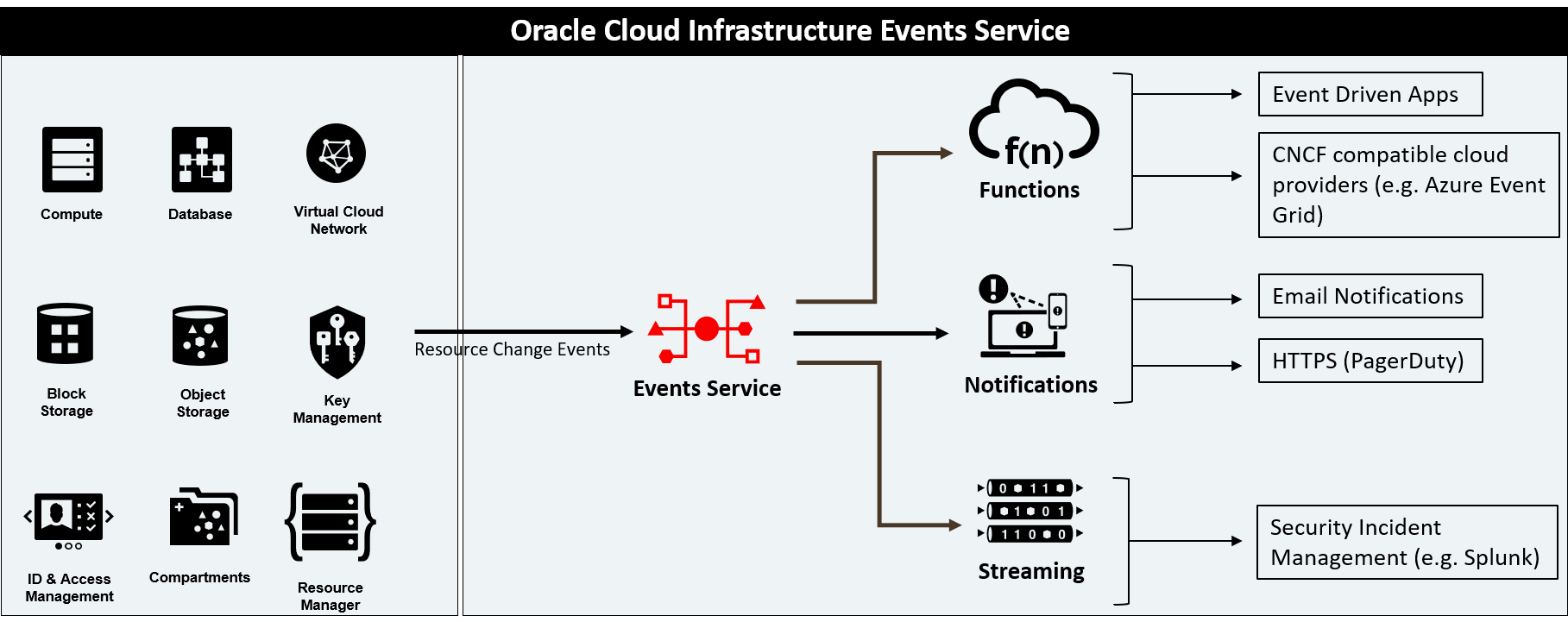We’re excited to announce the general availability of the Oracle Cloud Infrastructure Events service. The Events service lets you subscribe to changes in your cloud resources and respond to them by using Oracle Functions, Notifications, and Streaming. It eliminates the need to continuously poll your resources for changes and the overhead associated with doing that. The Events service is fully managed, durable, and scalable, and is an important building block for developing cloud native applications.
As part of our commitment to open standards, the Events service implements the Cloud Native Computing Foundation (CNCF) CloudEvents version 0.1 open standard. CloudEvents describes event data in a common and consistent way so that you can build applications across compatible cloud providers (for example, Microsoft Azure Event Grid) and with the rest of the CNCF serverless ecosystem.
Use Cases for Events
Following are a few common use cases for the Events service:
- Serverless application development: Out-of-the-box integration between Events and Oracle Functions lets developers build completely serverless, event-driven solutions. With Functions, you go beyond alerting, and act by running code. To learn more about Functions, see the Oracle Functions post.
- IT operations: IT operations engineers care when mission-critical compute instances, network security configurations, or database instances are modified, and they want to track and be notified about these changes as soon as they happen. These customers can now use the Events service to subscribe to mission-critical events and get email notifications or PagerDuty alerts via the Notifications service.
- Security operations: The Events service integrates with other services at the platform level to deliver a series of platform events. This means that the information available in audit logs about critical resource changes is also available via the Events service. Security engineers can integrate Events with Streaming to route these events to Security Incident Management systems such as Splunk for security analysis.
- Multiple clouds: Oracle and Microsoft recently announced enhanced cloud collaboration for running enterprise solutions for joint customers. These customers can now build applications across both clouds for processing events as Azure Event Grid and the Events service are CNCF CloudEvents open standard compliant.

Integrations and Region Availability
With today’s launch, you can subscribe and respond to events from the Object Storage and Database services. We are continuing to add platform events from other services. To find the complete set of services and events supported by the Events service, see the Events Service documentation.
The Events service integrates with Oracle Cloud Infrastructure Identity and Access Management (IAM) and is secure by default. You can control access to Events rules to selectively grant permissions to users and groups of users.
Events is available as a free service for all Oracle Cloud Infrastructure customers. Events is available in the Ashburn, Phoenix, Frankfurt, London, Toronto, Tokyo, and Seoul regions, and it will be available in the Mumbai region shortly. To find the complete of regions where Events is available, see the documentation.
The Events service is accessible via the Oracle Cloud Infrastructure Console, SDK, CLI, REST API, and Terraform.
Getting Started
You can find Events under Application Integration in the Oracle Cloud Infrastructure Console, where you can create and manage rules for subscribing to events. To get up and running with the Events service, use the Quick Start guide. For full service details, see the online documentation.
We want you to experience this new service and all the enterprise-grade capabilities that Oracle Cloud Infrastructure offers. Sign up for a $300 free trial or sign in to your account to see the Events service for yourself.
